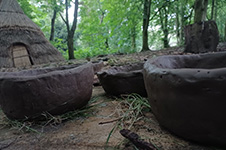What does the study involve?
This study will take place at the York Experimental Archaeology Research (YEAR) centre to find out more about how linking students to outdoor archaeology-based activities might benefit students’ health and wellbeing. The YEAR centre is an outdoor space on campus used for teaching and researching experimental archaeology. It is located in a quiet area of woodland next to the lake by Wentworth Graduate College. In this space we have reconstructions of a prehistoric house and Viking workshop, as well as open structures with central hearths that will provide shelter and warmth during the workshops.

We are interested in your experience of these activities and how they might benefit you. This information will help increase awareness of the benefits of outdoor archaeology-based projects and potentially encourage more investment in similar schemes in the future.
The study involves taking part in one of two workshops (i.e., bead making or pottery making) and completing two questionnaires. The first questionnaire will be completed before you take part in the workshop to find out some background information about you and your health and wellbeing, and engagement with the outdoors. The second questionnaire will be completed after you have participated in the workshop and focuses on your experience of the activity so we can understand more about your experiences of taking part, and what other factors affect them. A select number of participants will be invited to take part in a follow-up interview to explore perceptions about the acceptability and feasibility of the workshops; health and wellbeing benefits; and role of social learning about heritage craft.
The workshops will run on a weekly basis from February to May at the YEAR centre. Each workshop is two hours in duration and all materials will be provided. We expect approximately 8 - 10 people to attend per session.
Please click on the links below to find out more about each workshop and what is involved in taking part.
Bead making workshop

For the bead making workshop, participants will recreate stone beads using the materials and techniques that archaeologists think people used 11,000 years ago. The beads will emulate finds from two Mesolithic sites - Starr Carr, North Yorkshire, and Nab Head, Pembrokeshire, where evidence for bead making workshops have been found. The beads will be made from a soft shale collected from the Yorkshire coast, which is the most likely source used by people at Star Carr. The holes will be drilled using specially made flint drill tips, known as awls, which have also been found at these sites, with microscopic traces of wear suggesting they were used in this way. The workshops will give participants the opportunity to engage with prehistoric craft making using locally sourced materials, and explore different methods of drilling, decorating, and stringing the beads. To string them, participants will also recreate simple twisted string made from plant fibre, which has also been recovered from archaeological sites dating to the same period.
Pottery making workshop

In the pottery workshop, participants will make pots based on Anglo-Saxon types used during the 5-6th Century CE. Pots of distinctly early Anglo-Saxon type are found on sites throughout eastern England. These vessels were used for a range of activities including cooking, storage, brewing, dairying and as containers to hold the cremated remains of the dead. Anglo-Saxon potters made their wares by hand, using coils of clay to build up the vessel wall, and these were fired in simple bonfires. Although most pots were plain, those used for brewing, drinking and as cremation urns were highly decorated with stamp impressions and incised lines. Participants will use the same techniques to achieve their pots. Examples of decorative patterns that have been discovered on Anglo-Saxon pots will be available for participants to recreate on their own pots.
